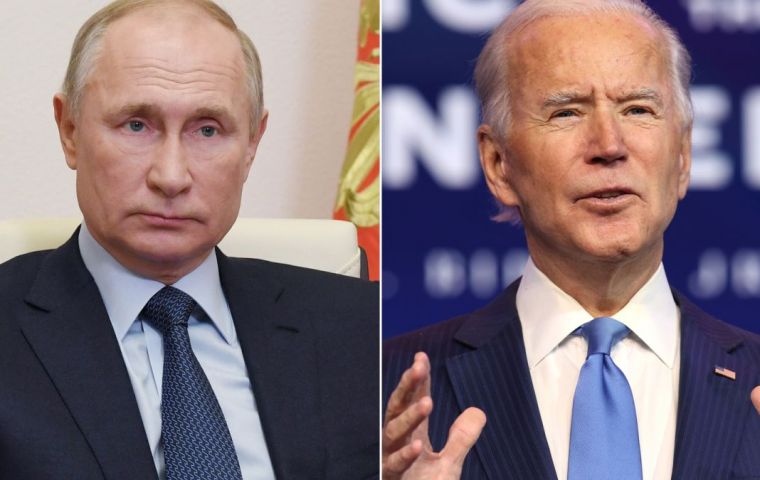MercoPress. South Atlantic News Agency
World sets eyes on Biden-Putin meeting in Geneva
 Biden and Putin are expected to meet for up to five hours in Geneva
Biden and Putin are expected to meet for up to five hours in Geneva The world will virtually stop Wednesday at least for five hours when US President Joseph Biden and his Russian counterpart Vladimir Putin meet in Geneva at a time when ties between the two countries are approaching Cold War lows.
According to diplomatic sources in Washington, Biden is out to build a stable and predictable relationship with Moscow while simultaneously resisting Russian acts the US Government disagrees with.
Biden is also said to be under pressure on how the US Congress might react and shall need to manoeuvre between the right choice of words and the harsher tone possible given the anti-Putin atmosphere back at his home.
The current Democratic leader began his presidency this year by prolonging the Measures for the Further Limitation and Reduction of Strategic Offensive Arms, commonly known as the New START treaty by five years. In addition, he repeatedly said that the United States did not seek a conflict with Russia but would give a rebuff if Moscow went ahead with activities the US found harmful to its interests. At the same time, his interview on the NBC television network in March, in which he answered in the affirmative to the question if he regarded Putin as a “killer”, heralded the degradation of bilateral relations to a record-low.
On the other hand, Putin has been at the helm of Russia for quite a while now and previous US Presidents thought of him differently. Or not quite so.
Bill Clinton, who had a warm rapport with Putin’s mentor Boris Yeltsin, found him cold but wrote in his memoirs that “Yeltsin had picked a successor who had the skills and capacity … to manage Russia’s turbulent political and economic life better than (the ailing) Yeltsin now could”.
George W. Bush privately called Putin “one cold dude” before he was elected. But he was charmed at their first meeting in Slovenia in 2001, famously saying he looked him in the eye to “get a sense of his soul” and ended up saying “He’s a man deeply committed to his country,” he added.
But his vice-president Dick Cheney, however, was unmoved saying when he saw Putin, “I think KGB, KGB, KGB”, referring to the Soviet secret service to which the Russian president once belonged.
Putin reportedly once said he would not be lectured on democracy. “We would not want to have a democracy like in Iraq,” he told reporters during a joint press conference with Bush, who has also admitted to then British Prime Minister Tony Blair that he nearly lost his nerve during a meeting with Putin. “At one point the interpreter made me so mad that I nearly reached over the table and slapped the hell out of the guy. He had a mocking tone, making accusations about America.”
When Russia invaded Georgia in 2008 Bush confronted Putin directly at the Beijing Olympics. He told him he had warned him that the Georgian president was hot-blooded. “I’m hot-blooded too,” Putin replied. “No, Vladimir,” Bush retorted. “You’re cold-blooded.”
Barack Obama -under whom Biden was Vice President- said that “I don’t have a bad personal relationship with Putin,” he told reporters in 2013. “When we have conversations they’re candid, they’re blunt … and constructive. I know the press likes to focus on body language and he’s got that kind of slouch, looking like the bored kid in the back of the classroom …”
Donald Trump made so little effort to disguise his admiration for the Russian leader that many in Washington wondered if he had been compromised by the Kremlin spy agencies Putin once led. “I like Putin, he likes me,” Trump insisted last year, telling the journalist Bob Woodward the “tougher and meaner” strongmen leaders were, “the better I get along with them”. Trump said after a 2018 summit that he was more inclined to believe Putin than the FBI over Russian interference in the 2016 US election. “President Putin says it’s not Russia. I don’t see any reason why it would be,” he added.
Biden resumed Obama’s hard-line saying “the days of the United States rolling over” in the face of Kremlin crimes were over. Asked if he thought Putin was “a killer”, Biden says, “I do.”
There was a time when the world's future was at stake if there was a meeting between the Presidents of the United States and the then Soviet Union.




Top Comments
Disclaimer & comment rulesCommenting for this story is now closed.
If you have a Facebook account, become a fan and comment on our Facebook Page!